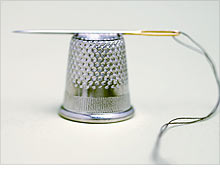Fixed in the USA (but made overseas)
Overseas outsourcing can cut costs, but it also takes a toll on quality. That's where Darn It! steps in.
 |
| When overseas outsourcers make mistakes, Darn It! steps in. |
(Fortune Small Business) -- Jeffrey Glassman's company isn't supposed to exist. That is, most of his customers would rather you didn't know about Darn It! and the services it provides from a warehouse in New Bedford, Mass.
Since the mid-'90s, when many U.S. clothing retailers began to ship their manufacturing work overseas, Darn It! has been working, on the down-low, with companies that are forced to repair their offshore-produced garments, toys and other goods. Need to switch the labels on 10,000 made-in-China T-shirts? Desperate to remove stains from 20,000 cutting boards? Hassles like these mean $4 million in annual revenue for the company.
Glassman, 40, got the idea for Darn It! just as Ronnie Manufacturing, his father's decades-old clothing manufacturing firm, was going under. One of his dad's former customers had just started having garments made in Mexico. He turned to Glassman for help fixing 30,000 pairs of pants and 30,000 skirts. Mission accomplished, the customer gave Glassman some free advice.
"He suggested that New England might need a service business like this for major manufacturers in the years to come," Glassman recalls.
Over the past decade, Darn It! - whose motto is "Your problem is our business!" - has grown to 100 employees (20 of whom used to work for Ronnie Manufacturing). The company now provides all manner of quality-control services, including laundering, storage and even toy inspection.
Glenn Cook, president of Turfer Athletics, a sportswear company in Providence, says Darn It! helps him meet tough deadlines and win contracts. Says Cook: "They offer us a competitive advantage in today's tough marketplace." ![]()
-
The Cheesecake Factory created smaller portions to survive the downturn. Play
-
A breeder of award-winning marijuana seeds is following the money and heading to the U.S. More
-
Most small businesses die within five years, but Amish businesses have a survival rate north of 90%. More
-
The 10 most popular franchise brands over the past decade -- and their failure rates. More
-
These firms are the last left in America making iconic products now in their twilight. More











